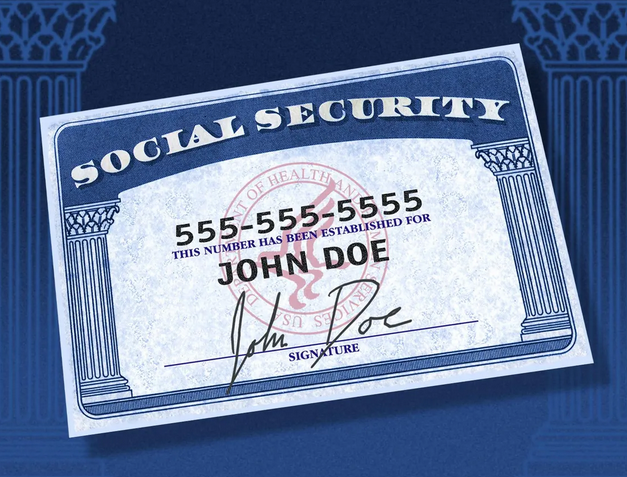Do You Have to Work to Get Social Security Benefits?
In this article we are going to learn more about the Social Security system to try and help you determine your eligibility for benefits. We will also answer the question of if or how much work you need to do to earn social security.

What Is a Social Security Card?
All people who are eligible to work in the United States are required by law to have a Social Security number if they intend to work. This comes in the form of a small card which features their full legal name and a unique nine digit number. These cards are considered an important piece of identifying documentation and are vital for American workers.
The Social Security number is a unique tax number that allows the government to withhold Social Security taxes from our paychecks. They collect these funds to act as a safety net which supplies income in the case of disability or for after retirement.
It was in November of 1935 as part of President Franklin D. Roosevelt's New Deal that the first Social Security numbers were issued. It took just three months for some 25 million unique numbers to be issued.

On November 24th 1936, there were 1074 post offices of the 45,000 nation that had been converted to typing centers. This was so that they could type out millions of Social Security cards. These cards were then all sent to Washington D.C. where on December 1st 1936 a special drawing took place.
This special draw saw Social Security Administration representative Joseph L. Fay choose an individual application at random from the top of a stack. This application belonged to John David Sweeney Jr. of Rochelle, New York making him the first person to officially receive a Social Security number.
The Social Security numbers however were not issued in chronological order so Mr. Sweeney did not get the lowest number which would have been 001-01-0001. This distinction actually went to Grace D. Owen of Concord, New Hampshire.
Until 1986 the average person applied for their Social Security number around the age of 14 as it was required to be able to work in the United States. After 1986 tax reform dictated that those claiming dependents over the age of five in their taxes had to obtain a Social Security number for them.
This change was to make sure that taxpayers were not claiming more dependents than they actually had. Previous to this the tax agency simply trusted that people were being truthful. Today you need to supply Social Security for all dependents claimed so most parents apply for a Social Security card for their child soon after birth.
What Is the Social Security Administration?
The Social Security Administration (SSA) is an independent government agency that administers social security. It is an insurance program that consists of retirement, disability and survivor benefits. In order to qualify for these benefits most workers pay into the system through Social Security taxes.
The head offices of the Social Security agency are located in Woodlawn, Maryland and are referred to as the Central Office. There are tens of thousands of workers employed by the Social Security agency and it is the largest government program in the United States.
It is estimated that by the end of the 2022 fiscal year the agency will have paid out $1.2 trillion in benefits to 66 million citizens and legal residents of the United States. An additional $61 billion is expected in SSI benefits and $7.5 million to low-income individuals.
This government agency is a vital part of the country's economy and without it millions of already struggling Americans would have nothing. It is a program that many have paid into for decades in preparation for retirement and as an insurance policy against sudden disability.
How Much Work Is Required to Qualify for Social Security Benefits?
There are several types of Social Security benefits and each has its own requirements for eligibility regarding work. In this section we will look at the common types and explain if you need to have worked to be able to claim them.
Retirement Benefits
Retirement benefits from Social Security are earned through the payment of taxes taken from an individual's paycheck throughout their working life. A minimum of 40 credits are required to qualify for full retirement which equates to around 10 years of full time employment.

Survivors Benefits
This is an important aspect of Social Security as it is designed to take care of dependents of beneficiaries who have passed away. This usually means either the spouse or minor children of the deceased individual who was eligible for a monthly benefit. There are some other dependents who may qualify for survivors payments but this may be on a case by case basis.
In terms of work the spouse may never have earned their own income during their life but can be eligible for benefits based on their deceased spouse's work history. The dependent children under 18 or under 19 if still in full time education also receive the benefit based on their qualifying deceased parents' work history.
Spousal Benefits
A non-working spouse would be someone who likely has not contributed enough into Social Security to qualify for benefits on their own merit. As mentioned this usually occurs from one spouse taking over the role of homemaker and parent while the other earns the revenue used to pay the bills and taxes.
Being married to an individual who is eligible for Social Security means that even as a non-worker the individual may be eligible for retirement benefits when the working spouse reaches at the earliest 62 years of age or receives disability benefits. Additionally the spouse can qualify for Medicare at age 65.
Social Security Disability Insurance (SSDI)
Social Security disability insurance was created to take care of tax paying citizens or legal residents who have contributed to Social Security through the payment of taxes should they become unable to work any longer. This generally kicks in prior to retirement age and does so because an individual has become unable to work due to a physical or mental disability.
This is not exactly like retirement but in terms of calculation it does have a similar system to determine how much a person may be eligible for. The time frame of income that SSDI takes into account when calculating a potential SSDI payment depends upon at what age a person becomes disabled.

Essentially the Social Security Administration counts up the years between when the applicant turned 22 to the first full year prior to them becoming unable to work. They then drop out between one to five years depending on how long that work history is. The final number of years are then considered the highest earning years for the individual and are taken into account for determining the SSDI payment amount.
Supplemental Security Income (SSI)
The Supplemental Security Income program provides cash payments to disabled adults, disabled children and seniors over 65 years old. It is a means-tested program meaning that eligibility is dependent on the applicant's income.
This program is open to citizens or nationals of the United States and unlike SSDI you do not need to have a history of paying Social Security taxes. This is because individuals who apply may never have worked due to their disabilities or some other reason.
This was a system that was created to replace federal-state adult assistance programs. These programs served the same purpose but were state specific. As these original state programs were inconsistent in their eligibility requirements they received a great deal of criticism.
Do You Have to Work to Receive Social Security?
So now we come to the big question: do we need a work history to claim social security? Well the answer is it depends on which type you are claiming. If you are eligible for SSI, spousal or survivors benefits then no you do not need to have had a tax paying work history.
If you are applying for a pension through Social Security retirement benefits or for SSDI then you will have had to make some minimum contributions into the system to be eligible.
Final Thoughts
We hope this article has been of some help in determining if you need to have a work history to claim Social Security benefits. There are some for which you need to have paid into the system while others if you are eligible do not require you to have ever worked.
Reference SSA Locator
If you use any of the forms, definitions, or data shown on SSA Locator, please make sure to link or reference us using the tool below. Thanks!
-
<a href="https://ssalocator.com/blog/do-you-have-to-work-to-get-social-security-benefits/">Do You Have to Work to Get Social Security Benefits?</a>
-
"Do You Have to Work to Get Social Security Benefits?". SSA Locator. Accessed on July 27, 2024. https://ssalocator.com/blog/do-you-have-to-work-to-get-social-security-benefits/.
-
"Do You Have to Work to Get Social Security Benefits?". SSA Locator, https://ssalocator.com/blog/do-you-have-to-work-to-get-social-security-benefits/. Accessed 27 July, 2024
-
Do You Have to Work to Get Social Security Benefits?. SSA Locator. Retrieved from https://ssalocator.com/blog/do-you-have-to-work-to-get-social-security-benefits/.